
Ireland had an estimated population of 5,281,600 as of 1 April 2023.
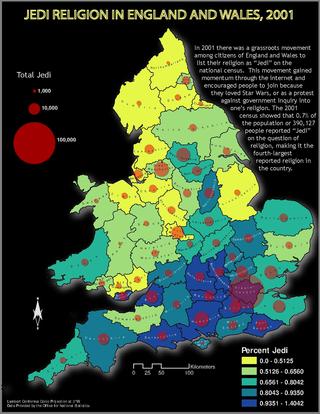
In some national population censuses which include a question on religious identity, media report numerous respondents giving their religion as Jedi after the quasi-religious order in the Star Wars science fiction franchise. While a few individuals claim to practise Jediism sincerely, the answer can be also a joke or a protest against the religion question. While giving false information on a census form is often illegal, any religion question is sometimes an exception; in any case, prosecutions are rare. The Jedi census phenomenon sprang from a 2001 urban legend spread by chain email prior to the separate censuses that year in New Zealand, Australia, and the United Kingdom. The email asserted that any religion passing a minimum threshold would be entitled to some form of official recognition. Other reasons proffered include "do it because you love Star Wars" or "just to annoy people". The 2001 censuses recorded Jedi as 1.5% of New Zealanders, 0.37% of Australians, and 0.8% of Britons. Later censuses there and elsewhere have recorded smaller proportions. In some cases any "Jedi" responses are collected under "other" rather than reported separately.

Humanists UK, known from 1967 until May 2017 as the British Humanist Association (BHA), is a charitable organisation which promotes secular humanism and aims to represent "people who seek to live good lives without religious or superstitious beliefs" in the United Kingdom by campaigning on issues relating to humanism, secularism, and human rights. It seeks to act as a representative body for non-religious people in the UK.
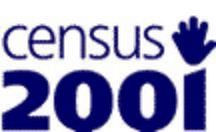
A nationwide census, known as Census 2001, was conducted in the United Kingdom on Sunday, 29 April 2001. This was the 20th UK census and recorded a resident population of 58,789,194.

British society is one of the most secularised in the world and in many surveys determining religious beliefs of the population agnosticism, nontheism, atheism, secular humanism, and non-affiliation are views shared by a majority of Britons. Historically, it was dominated for over 1,400 years by various forms of Christianity, which replaced preceding Romano-British religions, including Celtic and Anglo-Saxon paganism. Religious affiliations of United Kingdom citizens are recorded by regular surveys, the four major ones being the national decennial census, the Labour Force Survey, the British Social Attitudes survey and the European Social Survey.
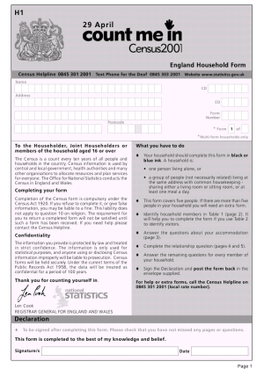
Coincident full censuses have taken place in the different jurisdictions of the United Kingdom every ten years since 1801, with the exceptions of 1941, Ireland in 1921/Northern Ireland in 1931, and Scotland in 2021. In addition to providing detailed information about national demographics, the results of the census play an important part in the calculation of resource allocation to regional and local service providers by the UK government.

Irreligion is common throughout all provinces and territories of Canada. Irreligious Canadians include atheists, agnostics, and secular humanists. The surveys may also include those who are deists, spiritual, pantheists. The 2021 Canadian census reported that 34.6% of Canadians declare no religious affiliation, which is up from 23.9% in the 2011 Canadian census and 16.5% in the 2001 Canadian census. According to Ontario Consultants on Religious Tolerance, among those estimated 4.9 million Canadians of no religion, an estimated 1.9 million would specify atheist, 1.8 million would specify agnostic, and 1.2 million humanist.
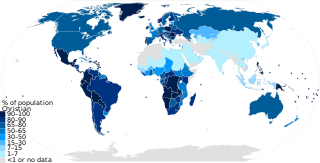
As of the year 2021, Christianity had approximately 2.4 billion adherents and is the largest religion by population respectively. According to a PEW estimation in 2020, Christians made up to 2.38 billion of the worldwide population of about 8 billion people. It represents nearly one-third of the world's population and is the largest religion in the world, with the three largest groups of Christians being the Catholic Church, Protestantism, and the Eastern Orthodox Church. The largest Christian denomination is the Catholic Church, with 1.3 billion baptized members. The second largest Christian branch is either Protestantism, or the Eastern Orthodox Church.

The 2006 Canadian census was a detailed enumeration of the Canadian population. Census day was May 16, 2006. The following census was the 2011 census. Canada's total population enumerated by the 2006 census was 31,612,897. This count was lower than the official July 1, 2006 population estimate of 32,623,490 people. The previous census was the 2001 census and the following census was in 2011 census.

The predominant religion in the Republic of Ireland is Christianity, with the largest denomination being the Catholic Church. The Constitution of Ireland says that the state may not endorse any particular religion and guarantees freedom of religion.

Atheist Ireland is an association of atheists based in Ireland. The group was initially founded by members of Atheist.ie, an online community set up by Seamus Murnane in June 2006. Its current chairperson is writer and activist Michael Nugent. Atheist Ireland is a former member of Atheist Alliance International, and a former member of Humanists International, and current member of The Coalition to Repeal the 8th, Children's Rights Alliance, the International Coalition Against Blasphemy Laws and the National Women's Council of Ireland. The group estimates it has about 500 members.

Atheism, agnosticism, scepticism, freethought, secular humanism or general irreligion are increasing in Australia. Post-war Australia has become a highly secularised country. Religion does not play a major role in the lives of much of the population.
Irreligion in New Zealand refers to atheism, agnosticism, deism, religious scepticism and secular humanism in New Zealand society. Post-war New Zealand has become a highly secular country, meaning that religion does not play a major role in the lives of many of the population.
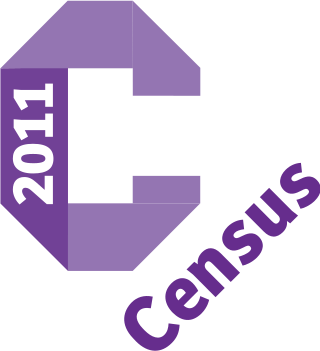
A census of the population of the United Kingdom is taken every ten years. The 2011 census was held in all counties of the UK on 27 March 2011. It was the first UK census which could be completed online via the Internet. The Office for National Statistics (ONS) is responsible for the census in England and Wales, the General Register Office for Scotland (GROS) is responsible for the census in Scotland, and the Northern Ireland Statistics and Research Agency (NISRA) is responsible for the census in Northern Ireland.

Irreligion in Ireland pertains to the population of Ireland that are atheist, agnostic, or otherwise unaffiliated with any religion. The 2022 census recorded that 14% of the population was irreligious; the second largest category after Roman Catholicism. The population was traditionally devoutly Catholic throughout much of Ireland's modern history, with a peak of 94.9% identifying as Catholic in the 1961 census. This percentage has declined to 69% in the 2022 census, the lowest recorded. Conversely, those with no religion made up less than 0.1% of the population in 1961; the proportion grew slowly until the 1991 census where it began to rapidly increase to its current share of 14% of the population in 2022.

This is a list of national population and housing censuses.
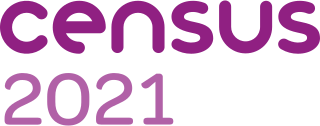
The 2021 United Kingdom census is the 23rd official census of the United Kingdom. Beginning in 1801, they have been recorded every 10 years. The decadal 2021 censuses of England, Wales, and Northern Ireland took place on 21 March 2021, and the census of Scotland took place 364 days later on 20 March 2022. The censuses were administered by the Office for National Statistics (ONS) in England and Wales, by the Northern Ireland Statistics and Research Agency (NISRA) in Northern Ireland, and by the National Records of Scotland in Scotland. These were the first British censuses for which most of the data was gathered online. Two of them went ahead despite the COVID-19 pandemic, in part because the information obtained would assist government and public understanding of the pandemic's impact. The census-taking in Scotland was postponed, and took place in 2022 because of the pandemic.

Hinduism is a minority religion in Ireland, followed by 0.7% of the country's population. It is also the second fastest-growing religions by percentage in Ireland. There are also a small number of recognised temples in the country.
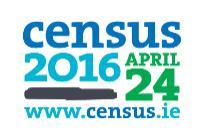
The 2016 census of Ireland was held in 2016. It was organised by the Central Statistics Office (CSO) and reported a total population of 4,761,865, or a 3.8% increase since the prior 2011 census. This was the lowest recorded population growth rate since the 1991 census, with the decline in population growth rates attributed to both lower birth rates and lower net migration. The census results were released gradually between April and December 2017 in a series of reports organised either as summaries or in-depth results of specific themes, like age, ethnicity, or religion.

The 2022 census of Ireland was held on Sunday, 3 April 2022. It was organised by the Central Statistics Office (CSO) and reported a total population of 5,149,139, or an 8.1% increase since the prior 2016 census. It is the highest population recorded in a census since 1841 and the first time the population exceeded five million since 1851. The census results were released gradually between May and December 2023 in a series of reports organised either as summaries or in-depth results of specific themes, like age, ethnicity, or religion.


















